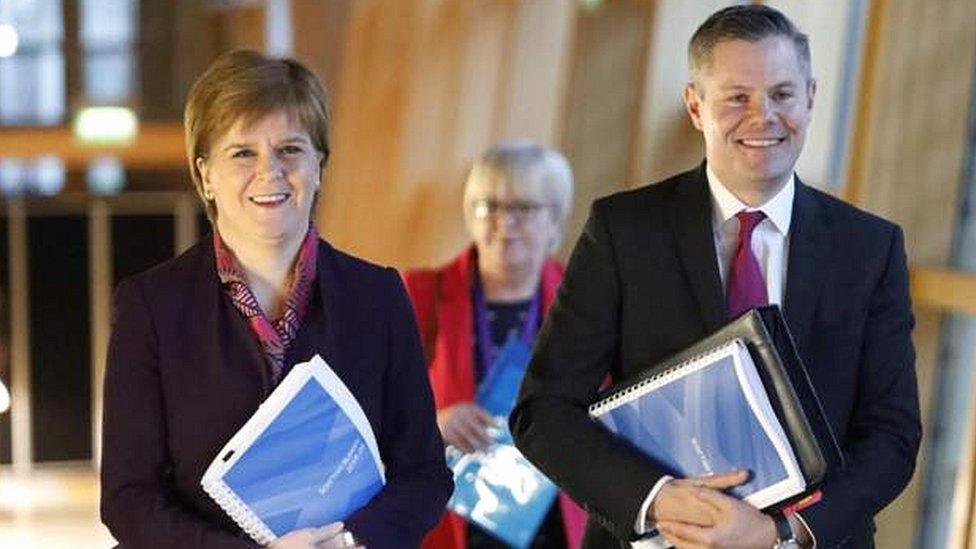Scottish budget: At a glance
- Published
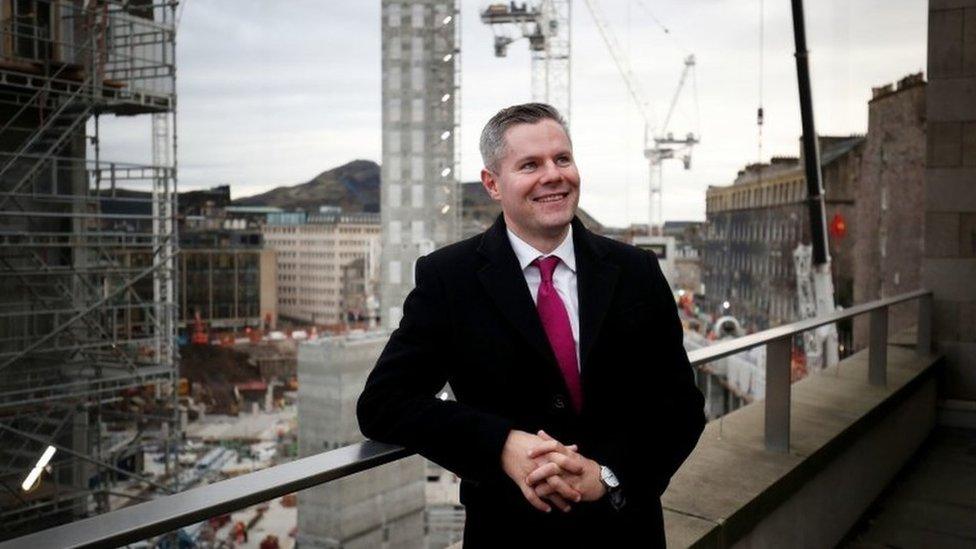
Finance Secretary Derek Mackay started budget day at the St James Centre development in Edinburgh
Scottish Finance Secretary Derek Mackay has struck a deal to pass his plans for tax and spending for the year ahead at Holyrood. What are the big ideas and spending commitments?

Taxes
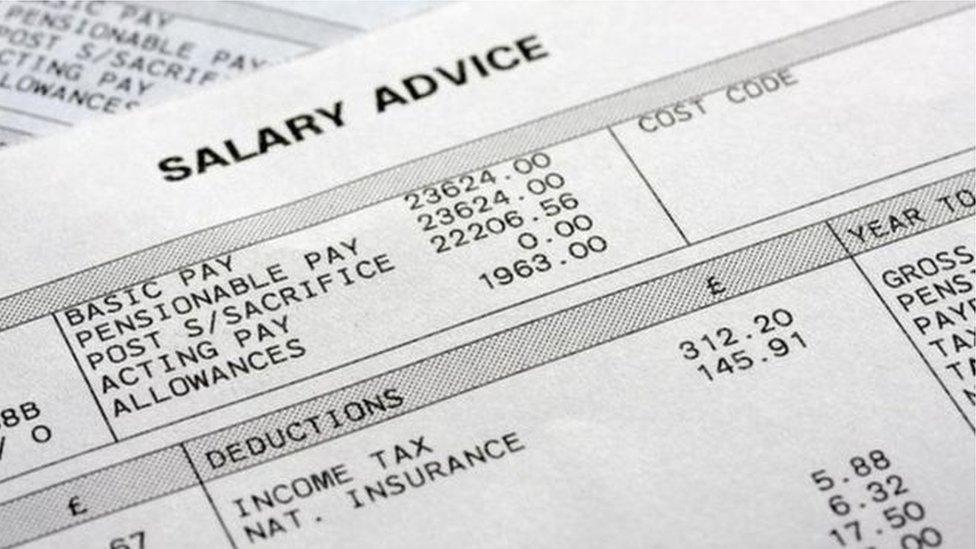
Income tax - a new five-band regime came into force last year and the finance secretary has decided to maintain the current rates.
He will increase the starter and basic rate thresholds by inflation in a move designed to help the lowest paid.
However, the Scottish higher rate threshold has been frozen - unlike in the rest of the UK where the threshold will go up to £50,000 from April - which Mr Mackay said would raise an extra £68m in revenue.
The move means the divergence between the income tax regime in Scotland and the rest of the UK continues to grow.
This was confirmed when MSPs voted to back the Scottish rate resolution by 61 votes to 52 on Tuesday, and the changes will kick in from the start of the new tax year in April.
Other taxes
Elsewhere, the replacement system for stamp duty in Scotland (Land and Buildings Transaction Tax) is also being revamped with the amount that buy-to-let investors or holiday home buyers pay on a second residential purchase going up from 3% to 4%.
The Scottish government's Small Business Bonus Scheme is maintained, while the non-domestic poundage rates paid by businesses will see a" below-inflation increase".
Local authorities will be allowed to increase council tax levels by up to 4.79%, and there will be cross-party talks about ways of replacing the council tax in the next parliament.

Spending
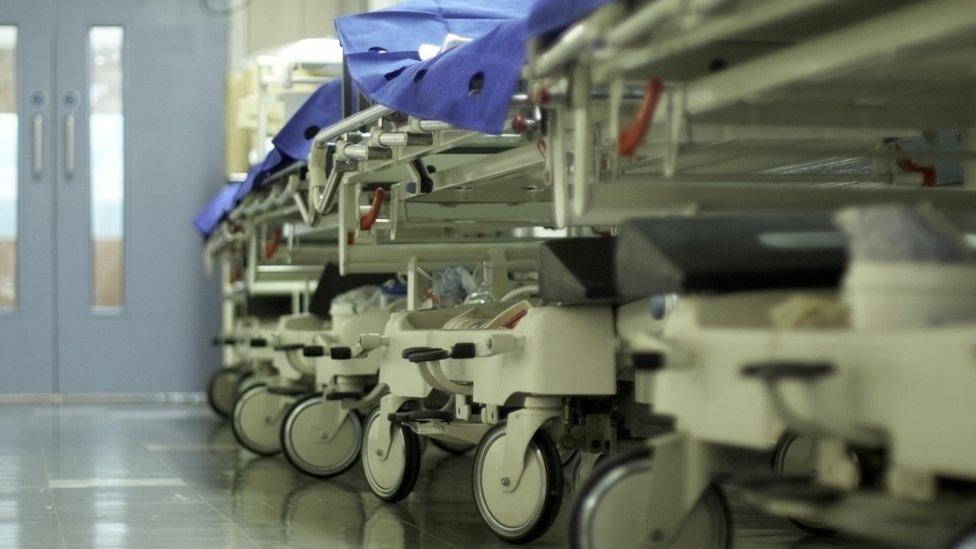
Health spending featured heavily in the draft budget
Health was the big winner with the Scottish government proposing an increase of almost £730m in health and care services, with much of the money being passed on in so-called "Barnett consequentials" from Westminster as a result of spending commitments by the UK government south of the border.
Education spending saw a real-terms increase including a £180m pot to raise standards in schools. Almost £500m has also been committed to aid the expansion of the early learning and childcare sector.
Support for business comes in the shape of £5bn commitment for capital investment to be spent on modernising Scotland's infrastructure, including a new £50m fund for regenerating run down high streets. Initial funding of £130m towards the establishment of a Scottish National Investment Bank has also been earmarked.
Public sector pay increases of 3% for those earning up to £36,500 have also been proposed, while those who earn between £36,500 and £80,000 will see their wages increase by 2%. Separate to the draft budget, it has been announced that MSPs will receive a 2.3% increase taking their salaries to £63,579.
Mr Mackay also said Scotland's 32 local councils will receive a real terms increase in both revenue and capital funding, taking the local government budget to £11.1bn.
The Scottish government has also committed more cash to the £2.9bn justice budget, claiming the police resource budget will be protected in real terms.
What else has he announced?
Other spending proposals in the document: £2m has been set aside to tackle "food insecurity" in the school holidays, while £5m will go towards supporting 2,000 women return to work following a career break.
Elsewhere, the government's external affairs budget - which "supports the promotion of Scotland and its interests at home and abroad" - will increase from £17.2m to £23.9m
The "Government Business and Constitutional Relations" budget has increased from £2.4m to £12.1m
Spending on the provision of free sanitary products in public places is proposed to jump from £1.2m to £2.8m next year.
The public agency for checking criminal records, Disclosure Scotland, sees its budget drop from £14.8m to £11.4m.
Highlands and Islands Enterprise sees its budget fall by £10m to £61.
The state-owned Glasgow Prestwick airport will be loaned another £6m in 2019-20, taking the amount of public money tied up in the Ayrshire airport to over £50m.

Fiscal forecasting
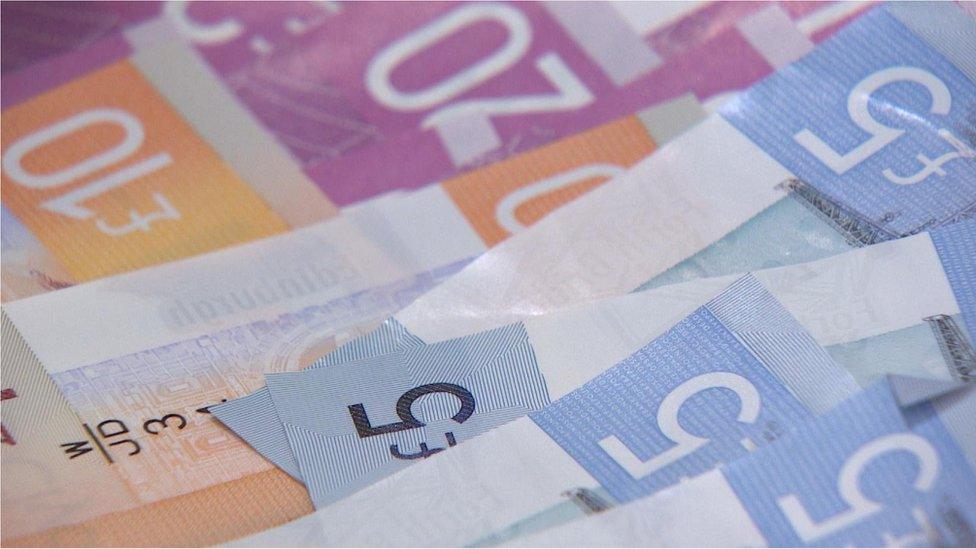
The independent economic forecaster the Scottish Fiscal Commission has produced forecasts on economic growth , externalfor the coming years and is predicting economic growth of 1.4% this year and 1.2% in 2019, which it says reflects "stronger recent economic performance, a more positive prospect for earnings over the next few years".
The commission forecasts that £15.2bn of the Scottish Budget will be raised by devolved taxes in 2019-20. Income tax raises the most revenue, forecast to be £11.7bn in the next financial year.

The Green deal
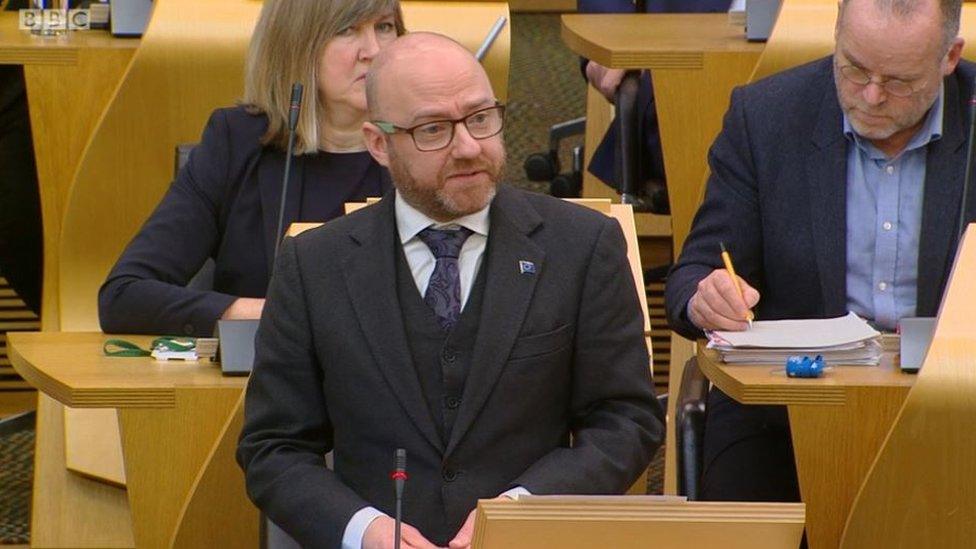
Patrick Harvie said the Greens had been "firm but constructive" in budget talks
After talks went down to the wire, Mr Mackay secured support for his plans from the Greens just hours before the stage one vote on the budget.
The agreement will see the Greens back the minority SNP government for the third year in a row.
It includes:
An extra £90m for the core local government settlement
The cap on council tax rises increasing from 3% to 4.79%
A move to three-year budgeting for local authorities
Legislation to let councils set a local "tourism tax"
Powers for councils to set a levy on workplace car parking spaces
Legislation to introduce a charge on disposable drinks cups
Talks on replacing the council tax, with legislation to be drawn up if not actually passed this term
Some of the changes - like the tourism tax and workplace parking levy - will not take effect in the coming year, but will be incorporated into future budgets.
- Published12 December 2018
